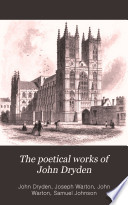 | John Dryden - 1867 - 556 pages
...poet's business is certainly to please the audience. " Whether our English audience have been pleased hitherto with acorns, as he calls it, or with bread, is the next question ; that is, whether the means which Shakspeare and Fletcher have used, in their plays, to raise... | |
 | Samuel Johnson - 1879 - 510 pages
...poet's business is certainly to please the audience. ' Whether our English audience have been pleased hitherto with acorns, as he calls it, or with bread, is the next question; that is, whether the means which Shakspeare and Fletcher have used in their plays to raise... | |
 | Dublin city, univ - 1883 - 510 pages
...post's business is certainly to please the audience. Whether our English audience have been pleased hitherto with acorns, as he calls it, or with bread, is the next question ; that is, whether the means which Shakspeare and Fletcher have used in their plays to raise... | |
 | John Dryden, Walter Scott - English literature - 1892 - 428 pages
...poet's business is certainly to please the audience.* Whether our English audience have been pleased hitherto with acorns, as he calls it, or with bread, is the next question ; that is, whether the means which Shakespeare and Fletcher have used in their plays to raise... | |
 | John Dryden - 1892 - 428 pages
...poet's business is certainly to please the audience.* Whether our English audience have been pleased hitherto with acorns, as he calls it, or with bread, is the next question ; that is, whether the means which Shakespeare and Fletcher have used in their plays to raise... | |
 | Samuel Johnson - 1895 - 234 pages
...poet's business is certainly to please the audience. "Whether our English audience have been pleased hitherto with acorns, as he calls it, or with bread, is the next question ; that is, whether the means which Shakspeare and Fletcher have used in their plays to raise... | |
 | Samuel Johnson - 1899 - 216 pages
...poet's business is certainly to please the audience. "Whether our English audience have been pleased hitherto with acorns, as he calls it, or with bread, is the next question; that is, whether the means which Shakspeare and Fletcher have used, in their plays, to raise... | |
 | Samuel Johnson - 1913 - 220 pages
...poet's business is certainly to please the audience. ' Whether our English audience have been pleased hitherto with acorns, as he calls it, or with bread, is the next question; that is, whether the means which Shakspeare and Fletcher have used in their plays to raise... | |
 | Richard Pape Cowl - English poetry - 1914 - 346 pages
...poet's business is certainly to please the audience. Whether our English audience have been pleased hitherto with acorns, as he calls it, or with bread, is the next question ; that is, whether the means which Shakespeare and Fletcher have used in their plays to raise... | |
 | John Dryden - English literature - 2003 - 1024 pages
...is, whether the means which Shakespeare and Fletcher have used in their plays to raise those passions before named, be better applied to the ends by the Greek poets than by them; and perhaps we shall not grant him this wholly. Let it be yielded that a writer is not to run down with... | |
| |